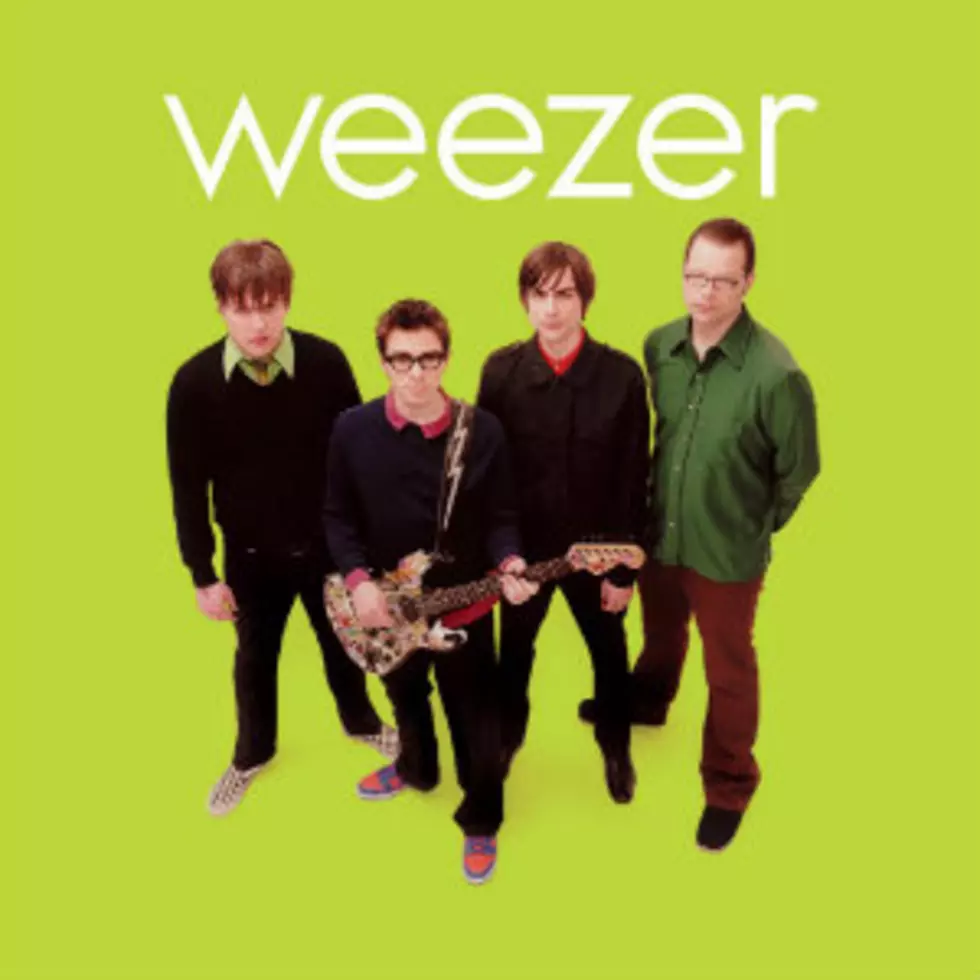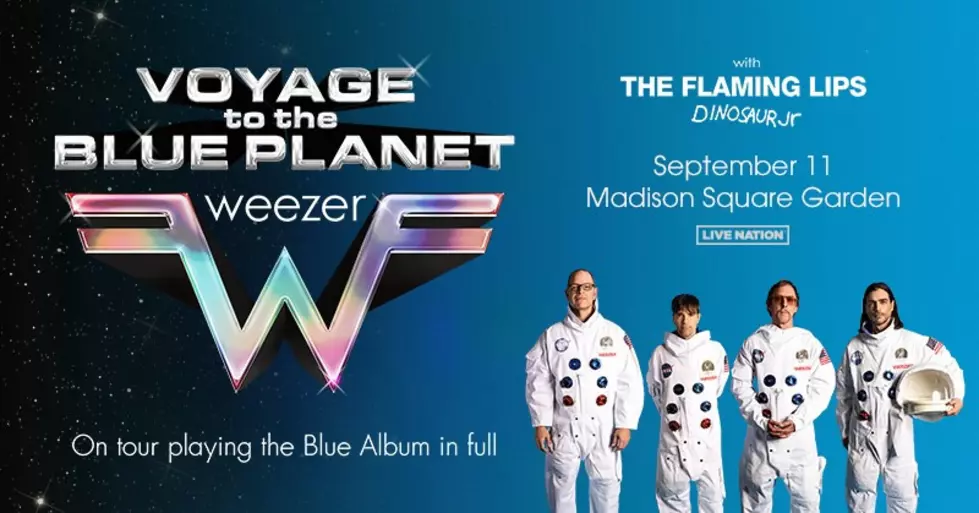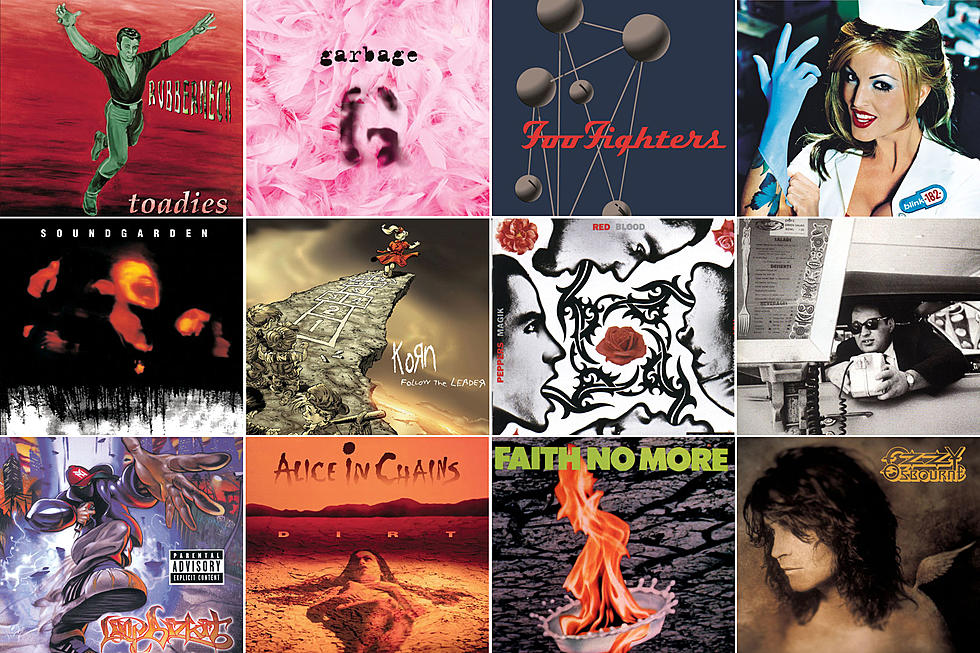
15 Years Ago: Weezer Return to Their Colorful Roots With ‘The Green Album’
Weezer’s self-titled 2001 full-length (known as "the Green Album") was a true “comeback album” in the classic sense of the phrase. Released 15 years ago this weekend, it was the band’s first album after a five-year absence and reignited the group’s career while bridging the gap between their two beloved but incredibly dissimilar first two albums. Still, the Green Album almost never gets a fair shake.
Of course, that’s understandable: Weezer’s self-titled 1994 debut (the "Blue Album") remains one of the tastiest helpings of guitar-pop ever crafted, while their 1996 follow-up, Pinkerton, became an underdog emo manifesto. Rather than trying to duplicate those successes, Rivers Cuomo and Weezer instead combined a bit of both records into something new, which wound up defining the new-era Weezer we’ve known ever since.
Upon first listen, it seems like Weezer had never gone anywhere. Even after the band’s lengthy hiatus, the Green Album was remarkably well-suited for the times: The record is essentially textbook new-millennium pop-punk released after the band’s run on Warped Tour the previous summer. The difference, however, is that the pop-punk is executed in the inimitable Weezer fashion (with a bit of chaotic darkness a la Pinkerton). With a focus on hooks and tight, energetic songwriting, the band move through the album at an appropriately brisk pace with only three of the 10 tracks breaking the three-minute mark for a total run time just shy of 30 minutes.
But the energy is palpable. The album bursts out of the gates with the driving rocker “Don’t Let It Go,” then shifts into a power trio of singles, from the crunchy retro cool of “Photograph” to the grungy “Hash Pipe” to the breezy “Island In The Sun,” which still remains one of their most ubiquitous hits. By the time you catch your breath with the tuneful trudge of “Crab,” half the album is already over, but then “Knock-Down Drag-Out” immediately re-sparks the tempo for the remaining second portion. Late, deep cuts like “Simple Pages” and “Glorious Day” help keep the listener engaged until the very end.
That ending, “O Girlfriend,” is seemingly ripped right from Pinkerton, offering flashes of the darker side of Cuomo, while putting his sonic twist on choruses that evoke Roy Orbison. Cuomos sings, “In your arms, I was happy as a little boy could be / Taking pills and mellowing out,” referencing a difficult period when he abused painkillers. Although Cuomo said he had later regretted the unflinching lyrical honesty of Pinkerton, he made sure that most of the lyrics on the Green Album are ambiguous. But “O Girlfriend” is a rare moment when Cuomo let his guard down, once again allowing listeners “in.”
That’s not to say Cuomo's more universal compositions lack punch. Rather, he channels his younger self on charmers like “Photograph” and “Island In The Sun,” while sprinkling in trademark vocal jive on songs like “Hash Pipe” and “Simple Pages.” Even the deep tracks feature sharp, well-executed hooks built on Cuomo’s clever melodies. And the decision to bring back Blue Album producer Ric Ocasek (the Cars) after they self-produced Pinkerton paid further sonic dividends. The Green Album is Weezer doing what Weezer do best and, while that may not qualify as groundbreaking compared to the confessional Pinkerton, it did reintroduce the band to a wider audience.
If there's one key element glaringly missing on the album, though, it's former bassist Matt Sharp, who left Weezer in 1997 to pursue his own band the Rentals. Thus, on the Green Album, we don't hear the same quirky, falsetto harmonies Sharp so frequently contributed on the first two albums. Sharp was replaced by Mikey Welsh, who Cuomo had befriended in Boston while attending Harvard, but Welsh is relatively understated in the mix. It was only a brief collaboration: Welch suffered a mental breakdown and entered a psychiatric hospital in August 2001 before being replaced with Scott Shriner. Tragically, Welsh died of heart failure a decade later.
Commercially, the album was a success and debuted at No. 4 on the Billboard 200 thanks in large part to the infectious lead single, "Hash Pipe." Critical reception was generally favorable, too; Rolling Stone said the Green Album is "a totally crunk, geek-punk record, buzzing through ten excellent tunes in less than half an hour with zero filler and enough psychosexual contortions to buy Cuomo's shrink another hot tub.”
Time has been equally kind to the record. Since 2001, Weezer have released seven more albums, although few come as close as the Green Album does to matching Pinkerton's consistency and showcasing the elements that personify the band. When taking stock of the Green Album, it makes perfect sense that Weezer are still as relevant as ever: after such meteoric beginnings, it was the moment Weezer proved they're in it for the long haul.
Worst to First: Every Weezer Album Ranked
More From WRRV-WRRB










